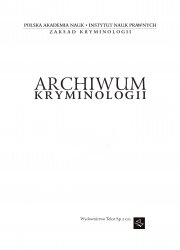HUBE – MAKAREWICZ – WOLTER. TRZY KONCEPCJE KARANIA NA PRZESTRZENI STU LAT
Hube – Makarewicz – Wolter: Three Conceptions
of Punishment in the Course of a Century
Author(s): Danuta JanickaSubject(s): Law, Constitution, Jurisprudence, Criminal Law
Published by: Instytut Nauk Prawnych PAN
Keywords: kara; Hube; Makarewicz; Wolter; koncepcje karania; kryminologia;
Summary/Abstract: The article presents the views of three prominent thinkers regarding criminal punishment: Romuald Hube (1803–1890), the father of Polish criminal law, Juliusz Makarewicz (1872–1955), the most distinguished interwar Polish lawyer, and Władysław Wolter (1897–1986), the founder of the Krakow school of criminal law. A presentation of the ideas on punishment developed by these masters of Polish jurisprudence provides an overview of the evolution of criminal law and political-criminal thought in Polish lands over the course of a century. Citing selected fragments from the works of the three professors, the Author examines how they interpreted punishment, what they believed its role to be, and what theories of punishment they put forward; moreover, which specific sanctions they supported. The article also assesses the language and discursive style of these leading lights of Polish legal science. Romuald Hube represented the classic school of criminal law. He published his Ogólne zasady nauki prawa karnego (General principles of the study of criminal law), a rudimentary, systematic interpretation of criminal law, at the age of 27. He was one of the first scholars in Europe to promote a mixed theory of punishment, inspired by Hegelianism and combining the idea of retribution with the preventive aims of punishment. Juliusz Makarewicz was a representative of modernism, the leader of the sociological school of criminal law, and the father of the first penal code in independent Poland. He made his reputation in 1906 with the publication of a work on the philosophy of criminal law. He published a broad range of dogmatic and historical studies, textbooks and a commentary on the 1932 Polish penal code. Makarewicz proposed an absolute justification of punishment, yet he saw retribution as ultimately preventive, nolens volens developing a mixed theory of punishment oriented towards specific prevention. Władysław Wolter was a student of the last eminent exponent of the classic school in Poland, Edmund Krzymuski (1851–1928), and at the same time a representative of normativism. He dealt mainly with general issues in criminal law, particularly criminal science. After the introduction of Makarewicz’s penal code, he immediately published his first textbook. He continued his academic career after the war all the way into the 1970s. Wolter adopted a modernist position within penal science and indicated the need for purposive punishment within the bounds of justice; he was therefore also a supporter of a mixed theory of punishment. Although all of the named professors promoted or embraced a mixed theory of punishment, their approach to the penal system differed to some extent. Hube gave priority to imprisonment, which he strongly believed to be important and effective. Makarewicz questioned the effectiveness of imprisonment and proposed a broad array of protective and probation measures, in addition to non-prison punishments. Like Wolter, he espoused the idea of two-track penal repression, i.e. a system of penalties and protective measures in response to criminal offenses. None of the named scholars rejected capital punishment outright, although all of them distanced themselves from it and hoped that it would be abolished in the future. Hube saw death as an exceptional, rarely used sanction. Makarewicz still foresaw no possibility of removing it from the catalogue of punishments due to the needs of criminal policy – he saw capital punishment as a deterrent, thus a general preventive measure. Wolter denied that it had any such impact, arguing that capital punishment did not deter offenders and was only a protective measure. As for monetary fines, Hube believed them to be appropriate only in the case of petty crimes, although he rejected confiscation of property as a sanction that affected the convict’s family. Makarewicz accepted fines, although he pointed to their limited impact and inequality. Wolter wrote in a similar vein, expressing an ambivalent attitude toward this legal sanction, revealing the inequality of its burden given convicts’ differing material status and recommending different legal solutions when it came to this type of punishment. The excerpts from the works of the great masters of Polish criminal science cited by the Author also allow us to see how the language and style of criminal science has changed. Hube was the father of Polish legal language. His analyses were mainly conducted in a philosophical and historical vein. Makarewicz employed a rhetorical style, often emotional, making legal comparisons. Wolter perfected his arguments, often highly abstract, relying mainly on logic and dogmatics. All three scholars were quite familiar with European legal theory and drew on its achievements.
Journal: Archiwum Kryminologii
- Issue Year: 2017
- Issue No: XXXIX
- Page Range: 5-26
- Page Count: 22
- Language: Polish

